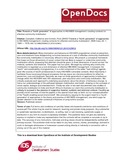Towards a “fourth generation” of approaches to HIV/AIDS management: creating contexts for effective community mobilisation
Abstract
Many biomedical and behavioural HIV/AIDS programmes aimed at prevention,
care and treatment have disappointing outcomes because of a lack of effective community mobilisation.
But community mobilisation is notoriously difficult to bring about. We present a conceptual framework
that maps out those dimensions of social context that are likely to support or undermine community
mobilisation efforts, proposing that attention should be given to three dimensions of social context: the
material, symbolic and relational. This paper has four parts. We begin by outlining why community
mobilisation is regarded as a core dimension of effective HIV/AIDS management: it increases the
"reach" and sustainability of programmes; it is a vital component of the wider "task shifting" agenda
given the scarcity of health professionals in many HIV/AIDS-vulnerable contexts. Most importantly it
facilitates those social psychological processes that we argue are vital preconditions for effective
prevention, care and treatment. Secondly we map out three generations of approaches to behaviour
change within the HIV/AIDS field: HIV-awareness, peer education and community mobilisation. We
critically evaluate each approach's underlying assumptions about the drivers of behaviour change, to
frame our understandings of the pathways between mobilisation and health, drawing on the concepts of
social capital, dialogue and empowerment. Thirdly we refer to two well-documented case studies of
community mobilisation in India and South Africa to illustrate our claim that community mobilisation is
unlikely to succeed in the absence of supportive material, symbolic and relational contexts. Fourthly we
provide a brief overview of how the papers in this special issue help us flesh out our conceptualisation
of the "health enabling social environment". We conclude by arguing for the urgent need for a 'fourth
generation' of approaches in the theory and practice of HIV/AIDS management, one which pays far
greater attention to the wider contextual influences on programme success.

